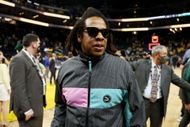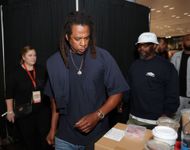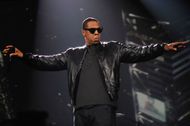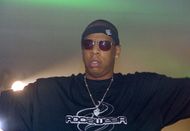Jay-Z, aka Shawn Corey Carter, not only climbed the hip-hop ranks, but he remapped what success meant in the game. Emerging out of Brooklyn's Marcy Projects, Carter directed his youth into sharp, economical lyricism and calculated drive, starting with the critical sensation Reasonable Doubt.
But his trajectory wasn't one-dimensional; over the years, he became a worldwide phenomenon, translating rap success into a business empire. His discography illustrates that evolution, gritty start, mainstream peak, and episodes of introspective maturity.
Both as an artist and a businessman, Shawn Carter embodies the maturation of hip-hop itself: from survival to power, from corner block to boardroom. Jay-Z's impact extends well past music – his career is a study in rebranding, legacy establishment, and cultural dominance. Far from being typecast by an era or style, he's always remapped the look of what a rapper should be, sliding effortlessly between street poet to world mogul.

His longevity is not about hits or awards, but about vision, understanding when to change direction, when to talk, and when to let his silence be louder. In a field where careers burn hot and fizzle out faster, he has been able to remain not only relevant but unapproachable, establishing a benchmark that few artists, in any genre, can come close to.
This capacity to change but remain true to his voice is what makes Jay-Z's catalog so timeless. Songs like Hard Knock Life and 99 Problems are not merely singles, they're signature tracks that tell us about various stages of his mindset and message.
The former showed his initial desperation and drive, while the latter, with its barbed observation and impenetrable hook, demonstrated his storytelling ability and defiance. Over the decades, Jay-Z's music has revealed his individual and cultural evolution, providing listeners with not only entertainment but also insight into power, survival, and self-control.
Disclaimer: This article contains the writer's opinions. Reader discretion is advised.
Here are the top 10 Jay-Z songs that changed the rap game
These are the best 10 Jay-Z songs that revolutionized the rap game, not only by topping their respective charts, but by altering the culture. Each song on this list represents a watershed moment, be it in sound, message, or the limits of what hip-hop could do.
From changing the hustler narrative to raising lyrical aspirations and business-savvy artistry, Jay-Z's greatest songs not only made waves but set precedents. These albums set a standard of reference for a whole generation of musicians, demonstrating that rap could be commercially successful and intensely personal.
1) U Don't Know (2001)
Before billion-dollar deals and luxury brands, U Don't Know was a bare blueprint of Jay-Z's business acumen and unshakeable confidence in himself. Placed far into the album, The Blueprint, the song is a manifesto of reinvention, from corner hustler to corporate titan, executed with surgical precision.
Just Blaze's frenetic beat, fueled by a flipped Bobby Byrd sample, not only reinforces Jay's message but also makes it larger than life, using horns and drums as the music of aspiration. Each bar is filled to the brim with purpose, shunning idle bravado in favor of actual numbers, actual danger, and actual risk.
Jay-Z doesn't just rap about wielding power, he shows how he gained it, brick by brick, dollar by dollar. U Don't Know is a hallmark track in his discography, wherein the myth of success is deconstructed to show the machinery that makes it happen.
Read More: 12 Linkin Park songs every fan remembers
2) Takeover (2001)
Takeover, from The Blueprint, stands out as a landmark track in hip-hop history, showcasing Jay-Z's sharp wordplay, strategic lyricism, and boldness in navigating rap rivalries. Kanye West produces the dense, guitar-rock-inspired rock-out sound to the track that combines hybrid beats taken from samples of The Doors' Five to One and KRS-One's Sound of da Police, generating music that is high-strung yet compelling.
Jay-Z not only disses Nas and Mobb Deep, he kills their careers with unprecedented precision, spitting off rhymes that sizzle with venom and brilliance. Even though the record stoked one of hip-hop's greatest feuds, it also cemented him as the genre's best hope, combining personal suffering with brilliance.
A diss record in the most technical sense only, Takeover was a statement of dominance, its congratulatory production and excess wordplay of the over-repertoire far beyond the beef that had bred it. It's the pinnacle of Jay-Z's career, a synopsis of his rise to dominance.
Read More: 12 most popular BTS songs that took the world by storm
3) 99 Problems (2003)
99 Problems, one of the record's highlights from his album The Black Album (2003), is a scathing indictment of racial profiling and the threat that rests on many African Americans. The rapper poetically recounts an eyewitness account of a standoff between police officers, sidestepping institutional racism's inherent unfairness.
The song uses police brutality and fear of discrimination, using the setting of a typical traffic stop as a metaphor for these broader social ills. Produced by Rick Rubin, the record is a mixture of rock and rap over a relentless, heavy beat that conveys its message.

The hook was a reference point for culture, merging comedy and biting condemnation of the world's injustices. While the song's danceable beat generates motion, more important is the impact that comes from its call to consciousness and action.
With Jay-Z, autobiographical narrative and social commentary are blended here in one fluid gesture so that this is not just a song but a lasting comment upon race, power, and resistance.
Read More: 12 Adele songs that made her a Queen of Soul-Pop
4) D'Evils (1996)
D'Evils from Reasonable Doubt is a career-decision point record that seeks out the moral conflict of ambition and betrayal. DJ Premier produced the track, creating a minimalist, haunting instrumental that serves as the experimentation by Jay-Z of greed, lying, and the psychological cost of ladder climbing.
Instead of glorifying the hustle, the rapper employs the song to present the seedy side of success, how one's allegiance is violated, and how boundless ambition contradicts oneself.

The raw, reflective rhymes of the song hang over a barren instrumental landscape, allowing room for Jay-Z's sharp commentary. His delivery is deliberate, anxious as he threads the strands of friendship, authority, and where ambition leads you.
D'Evils is the jumping-off point for the rapper's storytelling prowess, combining street legitimacy with existential heft that would characterize a good deal of his subsequent work.
Read More: 10 Bruno Mars tracks you can’t stop singing along to
5) Hard Knock Life (Ghetto Anthem 1998)
Hard Knock Life (Ghetto Anthem), the album title of Jay-Z's Vol. 2…Hard Knock Life was released in October 1998 and became his career anthem. The tune describes realistically, unglamorously, growing up poor like the speaker, in the ghetto.
It offers a harsh description of the difficulties for residents of underprivileged areas, alluding to the disparity between hope and the brutality of survival from day to day. The rapper bears witness to his own experience to give some idea of the strength needed to survive such hardship.

What makes the track so distinctive is the juxtaposition of harsh lyrics with the unexpected placement of Annie's classic chorus, creating a jarring contrast that surprised most listeners. The ostensibly realistic narrative behind the song and its socially conscious message generated debate about the ills of life in urban living.
It's a song that holds up today because not only was it talking about conflict, it was calling attention to us needing to pay more attention to the systemic injustice, so it's truly an amazing contribution to not only hip-hop but public culture.
Read More: Top 10 Olivia Rodrigo songs that showcase her songwriting brilliance
6) Where I'm From (1997)
Where I'm From on In My Lifetime, Vol. 1 is a stark, unglamourized depiction of Jay-Z's childhood in Brooklyn. The D-Dot and Amen-Ra produced track features a skeletal, trance-like beat swiped from Ronnie Laws' Friends and Strangers, lurking in the back to Jay-Z's skillful narration.

Jay-Z's words paint a rough portrait of the grim realities that haunt him, chronicling the daily struggle of existence in a tough neighborhood where brutality and violence are the code. In cut-and-dry fashion, the rapper's rhymes lay out the lay of the land sans pretense, an unabashed report card that pulls no punches.
The unflashy production serves to make his weight of history land harder, and he leaves room for his experience to become the focal point. It is not a glam song but one of accrediting the messy forces that shaped him, an early career excursion for him in that he leverages his platform to place the authenticity of his beginnings in the forefront.
Read More: 10 popular Lorde songs you can't miss
7) The Story of O.J. (2017)
In The Story of O.J. (2017), from the 4:44 album, Jay-Z excavates the intersections of race, class, and identity with greater depth than would have been possible with years of experience. No I.D. produced the track, which opens on a disquieting Nina Simone Four Women sample, over somber, piano-backed music that supports the dense themes of the song.
The rapper probes the illusion of shedding one's race by achieving prosperity through O.J. Simpson's reference point for more widespread societal and personal tribulations. His rhyme-spitting is calculated, fluctuating between musings on fiscal intelligence and the constraints of celebrity, revealing the institutional limits that exist even in wealth.

The song's minimalist refrain is a grim reminder of the immovable nature of race, and No I.D.'s sparse production guarantees Jay-Z's lines remain the center of attention. The ensuing animated video even adds to the track's formidable narrative, giving a visual nod to history.
Here, in this instant, Jay-Z becomes not the crass character he once was but a mature voice, reflectively critiquing both his own life as well as society's forces behind it.
Read More: 10 Britney Spears songs that ruled the charts
8) Song Cry (2001)
Song Cry, from Jay-Z's The Blueprint of 2001, is a rare moment of vulnerability, shedding the bravado-sheath to expose the emotional trash of a lost relationship. Sampled from Bobby Glenn's Sounds Like a Love Song, the Just Blaze production generates a hazy, blue melancholy that defies the rapper's normally stoic delivery.
Instead of comparing street life or political posing, the lyrics revolve around an abrasive relationship broken by distance and betrayal. Jay-Z doesn't cry himself, he gets the music to do it—a writer's trick that untruthfully keeps him serious but still makes space for vulnerability.
Released during the period when rap was trendy for its boastfulness, Song Cry deepened the genre's emotional complexity and informed the world that hip-hop could be as burdened by sadness as it was by toughness. It wasn't merely a highlight on The Blueprint, but a blueprint for emotional narrative in early 2000s rap.
Read More: 10 essential Chappell Roan songs you need to hear
9) Dead Presidents II (1996)
Released as part of Reasonable Doubt, Dead Presidents II is a milestone single in Jay-Z's early career, expressing the bitter truth of street-level aspiration through calculated words. Based on a dark jazz sample and minimalist production by Ski Beatz, the track places sampled piano melodies over muted drums, an introspective atmosphere thick with mood.

Jay-Z uses the space not for braggadocio, but for explanation, listing the struggle between survival and aspiration. Every verse is a deliberate examination of the stakes involved in the hustle, and economic pressure, betrayal, and self-preservation are braided into the tapestry.
The chorus that has been sampled by Nas is not just a hook, however, but a persistent reminder of the money behind every decision. This album doesn't just solidify Jay-Z's technical prowess, it accentuates the disciplined storytelling and cold control that would be the template for his career.
Read More: Billie Eilish’s 10 most popular songs of all time
10) Dirt Off Your Shoulder
Released in 2004 as part of The Black Album, Dirt off Your Shoulder came at a turning point in Jay-Z's career, purportedly as part of his then-retirement announcement. Based on Timbaland's minimalist, stuttering rhythm, the song employs the mere gesture of brushing dust from one's shoulder as a metaphor for shooing doubt, criticism, and adversity away.

Instead of a braggadocious anthem, it works more as a ritual of confidence, affirming the mental state that carried Jay-Z from street hustle to boardroom clout. The song's lasting popularity is due to its simplicity: endurance isn't bluster, it's intentional, concentrated, and unfazed by diversion.
Read More: Top 10 Rihanna songs that defined her reign in pop and R&B
Jay-Z's songs have never simply documented a life; they've charted a state of mind. Through decades of sonic reinvention, his music has been autobiography and blueprint alike, providing insight into ambition, hardship, rebirth, and dominance. Whether analyzing social dynamics, examining personal development, or striking pointed cultural observations, his body of work is a masterclass in lyrical precision and self-authored legacy.
A more-than-talented artist, the rapper has employed music as a tool to defy conventions and redefine success, leaving behind records that not only entertain but also empower.
Keep reading SoapCentral for more informative content!
Also Read: 10 Harry Styles songs every true fan knows by heart
